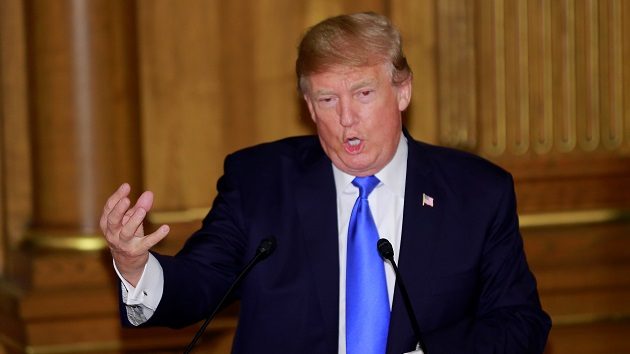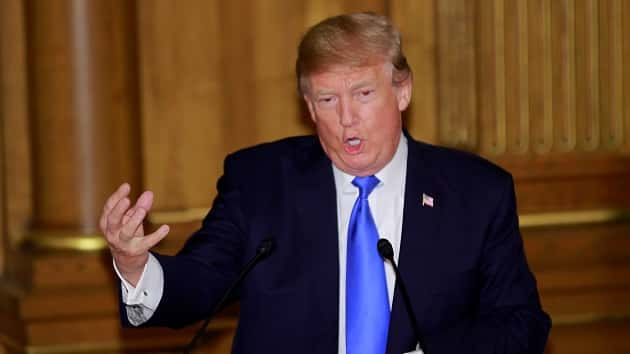
Shizuo Kambayashi / Pool/Anadolu Agency/Getty Images
 Shizuo Kambayashi / Pool/Anadolu Agency/Getty Images(NEW YORK) — The Department of Homeland Security has ended Temporary Protected Status for Nicaragua, meaning that the 2,500 Nicaraguans living in the U.S. under that special status have 14 months to leave the country.
Shizuo Kambayashi / Pool/Anadolu Agency/Getty Images(NEW YORK) — The Department of Homeland Security has ended Temporary Protected Status for Nicaragua, meaning that the 2,500 Nicaraguans living in the U.S. under that special status have 14 months to leave the country.
Today was the deadline for the administration to decide the fate of those Nicaraguans and some 57,000 Hondurans — but that second group will have to wait to see their future decided.
The department said that acting Secretary Elaine Duke had not yet made a decision about Honduras, requiring additional information on the conditions on the ground and saying Honduras had formally requested an extension. Given the current information, it is possible that the program will be terminated, a DHS official added.
No decision has yet been made about El Salvador or Haiti. A DHS official said that nothing should be read into today’s decision about the future of other temporary protective status programs, but the administration has already let ones for Guinea, Liberia and Sierra Leone all expire.
Temporary Protected Status is a special immigration status for people from a foreign country where the U.S. determines that conditions in that home country prevent those people from returning safely or where the country is unable to handle the return of its nationals adequately.
Nicaragua and Honduras were originally designated Jan. 5, 1999, because of destruction wrought by Hurricane Mitch. While infrastructure may have been rebuilt after the destruction, the status has been reauthorized every 18 months ever since because of the violent conditions in both countries.
Because of those continuous extensions, many of the people now facing deportation have been in the U.S. for nearly two decades, including some who have raised families here.
The decision on Nicaragua will be implemented 12 months after its deadline expires, meaning Jan. 5, 2019. DHS said that the U.S. has been in touch with Nicaragua, and they have assured the administration they will be able to receive these individuals back.
That Jan. 5 deadline means that after then, those Nicaraguans must be out of the country or they will be here illegally. The Trump administration will not consider them a priority for deportation, but they will be eligible for it, a DHS official told reporters Monday night.
The deadline for a decision on Honduras was extended six months, until July 5, 2018.
The Trump administration is now calling on Congress to legislate a “permanent solution” and “provide a certain future” for these individuals.
“We do hope and encourage Congress to look at this and find a solution,” rather than have the executive sign extensions every 18 months, as has been the case for over 20 years, a DHS official said.
“Recognizing the difficulty facing citizens of Nicaragua — and potentially citizens of other countries — who have received TPS designation for close to two decades, Acting Secretary Duke calls on Congress to enact a permanent solution for this inherently temporary program,” the Department said in a statement Monday night.
There is some movement among members of Congress to do that, just as there is to seek a solution to the Deferred Action for Childhood Arrivals — those young people brought to the U.S. illegally by their parents, also known as DREAMers — which Trump has also vowed to end.
“As Congress works to find a permanent solution for the Dreamers, it is apparent that we must also prioritize a legislative fix for the Temporary Protected Status program,” Sen. Ben Cardin of Maryland and the top Democrat on the Senate Foreign Relations Committee, said Monday, before the decision on Nicaragua and Honduras was announced.
The decision was made by Duke, in consultation with the State Department and other agencies, based on her review of the conditions and the requirements of the law, according to a DHS official, denying there was any pressure from the White House.
But Duke will soon be out of her role, pending the confirmation of Trump’s nominee for secretary, his current Deputy Chief of Staff Kirstjen Nielsen. Whether or not to expel 57,000 Hondurans who have been in the U.S. for years — a politically contentious issue — will be one of her first and most difficult decisions, if she is confirmed.
The executive must make a decision 60 days before the expiration deadline for each program. The next deadline is Nov. 23 for Haiti and Jan. 8, 2018, for El Salvador.
Copyright © 2017, ABC Radio. All rights reserved.


